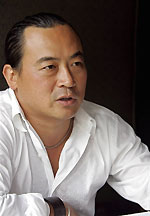Ma’s first IndoChine outlet in Singapore opened in 1999 offering dishes like Tom Som Laotian green papaya salad and pho bo, a Vietnamese beef noodle dish, prepared by chefs recruited from the two countries.
It became an instant hit with both locals and expatriates.
Since then, IndoChine has expanded to neighbouring Kuala Lumpur and the German city of Hamburg, where it has a three-storey 18,000 square foot (1,620 square metre) waterfront outlet.
Plans call for openings in Jakarta and the Thai resort of Phuket in the first half of next year.
In Singapore, a multicultural city-state known for the variety of Asian foods available, IndoChine outlets are still packing in crowds who can’t seem to get enough Vietnamese rice paper rolls, Sai Kog Laotian sausages and Laotian laksa, a spicy noodle soup.
Ma, 39, credits his success to an overwhelming desire to give his best in whatever he does, and says his hunger to excel stems from childhood experiences in Australia, where his family fled in 1975 after escaping the war in Laos.
Starting from scratch in a Western land helped toughen him, he says.
“Australia was a very racist country in the seventies, eighties… In a way yes, you get tougher growing up in Australia,” Ma told AFP in an interview over lunch at the first IndoChine.
“I’ve heard every insult there is on this planet growing up in Australia,” he said, adding he also had his fair share of fist fights and name-calling.
The abuse only made him want to prove that he was better, athletically and academically, than others.
“My point was, I really did want to show those guys that were really looking down on me in high school, in primary school that ‘Hey this little Asian guy can outdo you in everything you want to do.’ And I did.”
Ma was a commodities trader in Singapore before he decided to enter the restaurant business armed only with an economics degree, and his knowledge of what constitutes good Laotian and Vietnamese food.
“I am doing what I know, and that’s my native food,” he said.
“Indochine” was a French term used to describe Laos, Cambodia and what is now Vietnam during the period of French colonial rule.
Ma says the region can boast some of the best cuisine in Asia but it remains unappreciated outside its home soil.
“Vietnamese food is really, really great but people don’t know how to eat it and nobody has really marketed Laotian food and Vietnamese food that well,” he said.
The IndoChine concept delivers authentic food in an upscale ambience reflective of the region’s heritage. The first outlet features stone statues and framed images of Buddha.
“For us, it’s not only about design, heritage, culture, food,” Ma explained. “It’s a whole thing.”
The ponytailed Ma has been eating at IndoChine restaurants almost every day for the last seven years.
He said he realized there was a market for the traditional fare after he brought it back from Vietnam and Laos and served it at parties with friends, many of whom were Westerners.
“Wow it’s fantastic! I love the food!” he recalled their reaction.
That set the stage for the naturalised Australian to begin his foray into the restaurant business. In a huge investment with no guarantee of success, he acquired a shop on the edge of Singapore’s central business district for 2.2 million Singapore dollars and opened the first IndoChine outlet.
He said he has no regrets about leaving his well-paid trading job, but declined to reveal how financially successful IndoChine has been.
“You know, my mentality is I do what I enjoy. It’s not about money. It’s what I enjoy, what I like to do and what my challenges are,” Ma said.
Asked if he was ever afraid IndoChine might not make it, Ma referred to his family’s history. They had been rich in Laos but then lost it all.
“If I go back to nothing it’s okay,” he said. “There’s only one way, it’s up, and that’s how the refugee mentality is.”
If Ma has his way, he will spread the tradition and culture of Asia to the rest of the world through his IndoChine restaurants.
“There is something I want to do for Pan Asia,” Ma said. “Asian culture and heritage is so rich and vibrant. Why does it take a Westerner to market Asian things and resell it back to Asians?”
He said he is showing the West that he can do it, “and this is coming from an Asian perspective”.
Image: Former Laotian refugee Michael Ma looks on at his first IndoChine outlet in Singapore, 07 November 2006.

